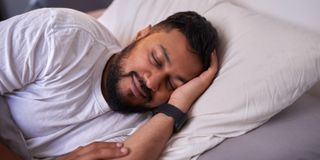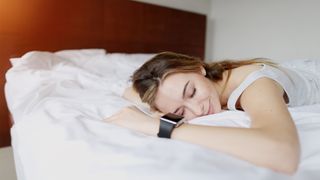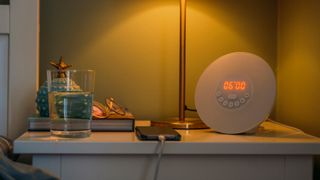I asked an expert if using a fitness watch could really help my sleep
How do you use your sleep tracking data?

One of the first things I do when I wake up is check my smartwatch to see how well I slept last night, and I know I’m not alone. Anyone with one of the best sleep trackers or smartwatches can probably relate.
Thanks to modern technology, I get to know how many sleep cycles I had, and when I was in deep sleep, light sleep, and REM (rapid eye movement) phases. I can see interruptions, such as when I got up to get water. However, what the heck do I do with all this information, and how can I use it to sleep better?
For starters, it’s good to know that even on commercial devices, we can be reasonably sure of our sleep tracker’s accuracy. One study conducted in 2018 on devices such as the Garmin Vivosmart and Jawbone bands found that “some of the wearable trackers resulted in closer approximations to self-reported sleep outcomes than a previously sleep research-grade device.”
While they might not be able to take on more advanced sleeping disorders, the study did conclude that “these trackers offer a lower-cost alternative to tracking sleep in healthy populations”.
So now we have lots of high-quality, reasonably accurate information about our sleep. But is it important to know exactly how many sleep cycles we went through, and other esoteric information? After all, it's not like we can choose to get less light sleep and more deep sleep.
Stephanie Romiszewski from the Sleepyhead Clinic is an expert sleep physiologist with an Msc in Behavioral Sleep Medicine. She told us: “It’s only really important to track your sleep for a particular reason. I, as a sleep expert, would never ask someone to track their sleep unless I was trying to resolve a specific problem, and I had a specific plan for them to follow.

“Even if you have a tracker that can show you you’re getting this percentage of deep sleep and that percentage of REM, you’ll never be able to focus on improving a specific area of your sleep, only the overall quality of your sleep in total.”
Get daily insight, inspiration and deals in your inbox
Get the hottest deals available in your inbox plus news, reviews, opinion, analysis and more from the TechRadar team.
So is sleep tracking generally a useless practice? If you’re a new parent up at all hours of the night, your Fitbit admonishing you for a night of poor sleep might be enough to make you throw it out the window. But don’t ditch the idea of sleep tracking entirely: we can use this information.
The idea is simple: If you're worried about your sleep quality, there are some small lifestyle changes you can make. You can use your fitness watch or sleep tracker to monitor your overall sleep quality, and to check these changes are working.
How to improve your sleep
“I would call this little regime a ‘reset’, so you get better quality of sleep at night,” said Romiszewski. The first change she recommends is waking up and starting your day at the same time every day, even on weekends.
“And by waking up, I mean getting up. That’s really helpful for your circadian rhythms, the physiological processes that make up your 24-hour cycle. If you keep moving that time, even if it’s not by much, your body gets confused about when it’s supposed to make you feel hungry, or full, or what it should be doing with your mood, alertness, energy, and sleep drive.
"Consistency means you’ll be feeling sleepy at the same time each evening.”
On that note, there’s no need to have a strict bedtime; Romiszewski says you should give your body permission to go to bed when it’s feeling sleepy, not when you decide you need to go to bed. “People try and control when they go to sleep, but don’t want to control when they wake up. It’s all the wrong way round.”

Finally, wake up properly, either getting some sunlight on you ASAP, or using a wake-up light. “Use light exposure: light is the most amazing free external energy source that is available to us humans. If you are putting this schedule in place, you can use a bright light to almost cheat your way into feeling better.
"Exercise is also great for reducing feelings of sleepiness. Consistently done, you will notice an improvement in sleep quality and duration.”
Here’s where fitness trackers come into play: by measuring overall sleep quality, trackers can be incredibly helpful in monitoring your progress and ensuring these changes are landing, says Romiszewski.
If you’re still feeling groggy upon waking, take a look at your fitness tracker’s sleep cycle data: you may need to adjust your wake-up time 15 minutes earlier or later, to avoid waking up in the middle of a REM or deep sleep phase.
Worried about your bedrest? Go in with a plan, and use the tracker to check the plan is working. If all else fails, try one of our best pillow choices.

Matt is TechRadar's expert on all things fitness, wellness and wearable tech. A former staffer at Men's Health, he holds a Master's Degree in journalism from Cardiff and has written for brands like Runner's World, Women's Health, Men's Fitness, LiveScience and Fit&Well on everything fitness tech, exercise, nutrition and mental wellbeing.
Matt's a keen runner, ex-kickboxer, not averse to the odd yoga flow, and insists everyone should stretch every morning. When he’s not training or writing about health and fitness, he can be found reading doorstop-thick fantasy books with lots of fictional maps in them.
